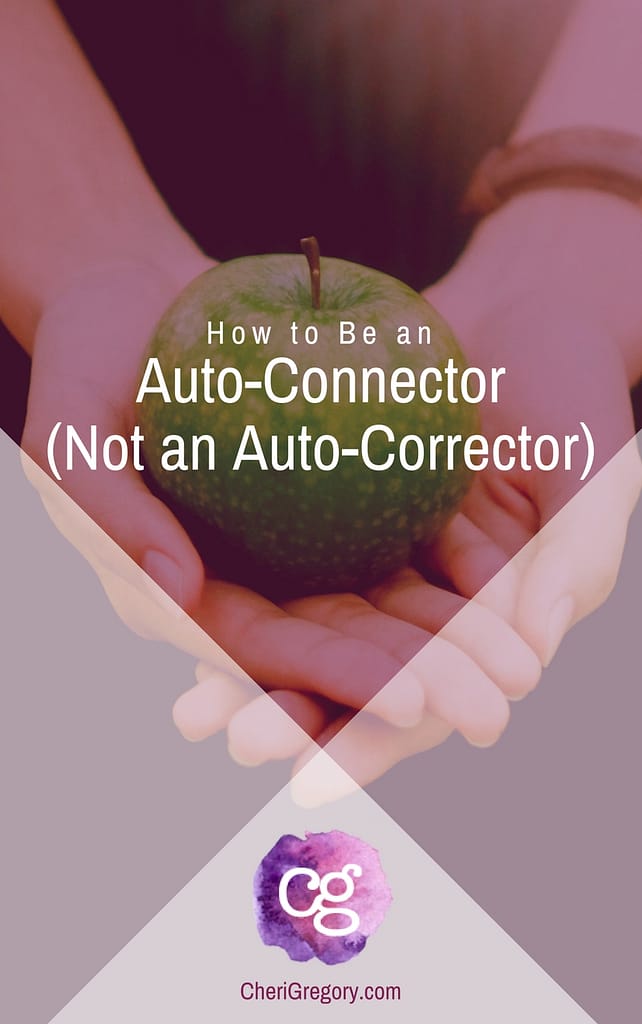How to Be an Auto-Connector (Not an Auto-Corrector)
“I’d been warned about this particular student,” Joyce begins.
She pauses and looks over the room of teachers — each one of us listening expectantly, some nodding already. Somehow she knows that we’re all thinking, Oh, I’ve had a “particular student” of my own!
Joyce smiles and continues. “Let’s call him … Johnny.”
Although he was just entering third grade when Joyce became his teacher, Johnny was already infamous for “defying authority.”
Joyce frowns as she says the phrase “defying authority” then repeats it with sadness and wonder, as if she can’t quite believe that someone so young had been given such a weighty label.
“It was my third year teaching. And we know what that means.”
A buzz of agreement ripples through the room. Your first year of teaching is about survival. Your second year is still drinking from a fire hydrant. But by your third year, although you’re still a newbie, you start to find your stride.
“I made a decision about Johnny before I ever met him.”
Again, a dramatic pause. We lean in.
Pre-Decision in Action
On the first day of school, she announced, “I need someone to help pass out the crayons. Johnny! Would you help us out?” And she handed him the basket of crayons. When he was done, she said, “Thank you so much, Johnny!” and gave him a big smile.
When she noticed him working on his math worksheet, she stopped by his desk and whispered, “I appreciate how quietly you’re working, Johnny!” and then walked on to speak with other students.
At the end of the day, she made a point to tell him, “I’m so glad to have you in my class this year, Johnny. See you tomorrow!”
Joyce stops talking and walks slowly across the stage, as if going back in time.
“Now, be assured, I saw evidence for Johnny’s reputation that first day. He did all sorts of things he wasn’t supposed to do. And he didn’t do things he was supposed to do. He was no angel. But I’d made a decision about Johnny, and I stuck with it.”
When he took another student’s notebook, Joyce asked him to “Please give it back.” When he did, she said, “Thank you, Johnny.”
As he tried to cut in line at the drinking fountain, Joyce directed him to “please move to the back of the line.” When he did, she said, “That’s it, Johnny.”
If he spoke up in class without permission, Joyce raised her hand and gave him a knowing look. When he raised his hand, she said, “Wonderful. Yes, Johnny?”
Joyce walks back to the podium, clears her throat, and asks, “Do you know what decision I made about Johnny?”
The Power of a Name
I squirm in my seat. No, I don’t. I can’t quite figure it … Wait. I get it. I do! I do!
Joyce’s decision was to only use Johnny’s name when she was encouraging him.
Here was a child who had heard, “No, Johnny!” and “Stop it, Johnny!” and “You’re a trouble-maker, Johnny!” his entire life.
But for one full year he heard, “Thank you, Johnny!” and “That’s it, Johnny.” and “Wonderful. Yes, Johnny?” and dozens of other affirmations from a third grade teacher who chose to be an encourager.
Joyce made a simple but powerful decision to disconnect his name from correction and intentionally pair his name—his very identity—with connection.
She knew the power of using a name in a redemptive conversation.
One Way to Be an Encourager
The more consciously I battle my own deep-seeded perfectionistic nature — my knee-jerk urges to correct people who are wrong (and let me tell you, there are a LOT OF THEM!) — the more I find myself in awe of Joyce’s intentionality.
I see a problem and jump in to fix it, with or without an invitation, because I am such an auto-corrector.
(Of course, I hate it when autocorrect messes with me! It never knows what I’m actually trying to say, it creates extra work, and it makes me feel foolish. My number one hashtag = #AutoCorrectFail)
It’s so natural to be an auto-corrector.
But Joyce pre-decided to be an auto-connector.
To look beyond outer mistakes and failures and see the inner person, the individual.
Her intentional choices to lead with love and grace transformed countless lives, my own included.
I am not naturally like Joyce. I’m naturally nit-picky, president of Control Freaks Anonymous and chair of the Hair-Splitter’s Convention. My instinct is to use names for nagging.
But I want to be an encourager, like Joyce.
Who was so much like the Jesus she adored.
Jesus: Our Ultimate Role Model
Jesus put connection before correction.
- He demonstrated unwavering compassion as he said, “[Pharasee] Simon, I have something to tell you.” (Luke 7: 36-50)
- He expressed deep concern as he said, “Martha, Martha, you are worried and upset …” (Luke 10:38-42)
- He showed complete forgiveness, as he said, “Simon [Peter], son of John … feed my sheep.” (John 21:15-19)
Clearly, He also knew the power of a name in a redemptive conversation.
It’s so natural to be an auto-corrector.
But you can become an auto-connector.
You can learn to look beyond outer mistakes and failures and see the inner person, the individual.
Decide to be an encourager.
Lead with love and grace.
Choose connection before correction.



Thanks – I’ve been trying this with my own “students” (my homeschooled kids). It gets too easy to focus on what they aren’t doing instead of who they are and what they do!
Just wanted to say, I love this!
Love it!